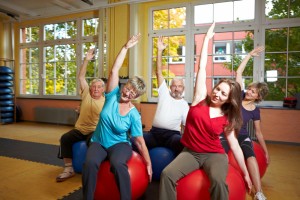
People who have fibromyalgia syndrome can suffer from chronic widespread pain creating difficulty with day-to-day tasks that can often be frustrating to the individual.
Despite the general health benefits associated with exercise, people with fibromyalgia syndrome are often reluctant to undertake exercise, as they perceive a risk of exacerbating their symptoms. So what are the best exercise programmes for people with fibromyalgia?
A recent systematic review has evaluated the effect of exercise on aerobic functional capacity in adults with fibromyalgia syndrome.
Here’s what they did
The authors searched 7 electronic databases looking for randomised controlled trials that evaluated the effects of exercise compared with a control on aerobic functional capacity in adults with fibromyalgia syndrome.
Physical exercise included; aerobic, strength, combined, aquatic and multidisciplinary.
Control groups included; no exercise, education or usual care.
Quality of the studies were evaluated using the Physiotherapy Evidence Database scale.
Here’s what they found
- 13 studies were included.
- Exercise types included; aerobic n=3; strength n=2; combination n= 2; aquatic n=4; and multidisciplinary n=3
- Exercise programmes ranged from 6 to 24 weeks, with 0.5 to 3 sessions per week and session duration ranging from 20 to 60 mins.
- Functional aerobic capacity (6-min walk test) was found to improve with aerobic exercise (Effect size (ES)=0.85; 95% CI, 0.57-1.12) and aquatic exercise (ES=0.44; 95% CI, 0.15-0.73),
- Strength training and the multidisciplinary programmes were not found to improve function
The authors concluded
Physical exercise (aerobic and aquatic exercise) performed at least 2 times per week and 30-60min per day is effective for increasing functional aerobic capacity in adults with fibromyalgia syndrome.
Aerobic and aquatic exercise is effective for increasing functional aerobic capacity in adults with fibromyalgia.
The Musculoskeletal Elf’s view

Physical exercise has been used as common practice to assist in the improvement of symptoms for people with fibromyalgia. However there is little guidance in clinical guidelines for exercise prescription in this population. This is further complicated as there are many associated symptoms in people with fibromyalgia and many guidelines need to provide generic guidance. This systematic review has provided an important starting point for individuals with fibromyalgia syndrome looking to introduce an exercise routine.
The recommended standard of the American College of Sports Medicine for exercise programmes is 2 sessions of 20 min duration per week. Interestingly all the studies included in this review met this minimum standard.
What do you think?
- Do you prescribe exercise for patients with fibromyalgia?
- What type of exercise do you find to be the most effective?
- How do you determine what intensity to start the patient on, and what progression parameters do you employ?
Send us your views on this blog and become part of the ever expanding Musculoskeletal Elf community. Post your comment below, or get in touch via social media (Facebook, Twitter, LinkedIn, Google+).
Links
- Effects of exercise on functional aerobic capacity in adults with fibromyalgia syndrome: A systematic review of randomized controlled trials. García-Hermoso A, et al. J Back Musculoskelet Rehabil. 2014 Nov 18


Can exercise increase functional capacity in adults with fibromyalgia? http://t.co/VwbCCf7NDv via @sharethis
My latest post of the musculoskeletal elf. Please share. :-) http://t.co/gqBe3Cdj8k
New blog #exercise for #functional capacity #fibromyalgia http://t.co/rnrF52Oo5v @arthritis_care @theCSP @WeAHPs
Have #fibromyalgia should you #exercise http://t.co/JFWHMd7DuW @arthritisFdn @ArthritisToday
Can #exercise improve function adults #fibromyalgia http://t.co/JFWHMd7DuW @ArthritisSoc @ArthritisNRF
@MSK_Elf @Mental_Elf well it is obvious that doing aerobic exercise will increase ability to do more exercise but did pain score improve?
unfortunately the paper doesn’t mention pain scores, and poorly defines what it means by functional aerobic capacity. Included studies varied in their prescription and few recorded adverse effects and adherence, with only one study reporting having to reduce intensity of sessions due to muscle soreness lasting >3days. There needs to be more research into exercise prescription for this complex patient group.
I couldn’t agree more. I have had ME and severe but intermittent (but lasting from months to a year) of chronic pain in my soft tissues. I’m up to driving short distances now and walking about 2 miles but I don’t puff so I guess it’s not aerobic. 2 weeks ago, I was at a spa and after the jacuzzi, steam room and sauna went into the pool to chill. It was so inviting I dove under and floated but using my arms and legs a bit over to the side of the pool and back (I don’t mean length). The next day all my body was wracked with pain the severity of which I haven’t had for about a year and it returns on mild stretching or walking which were my routine before. Doesn’t fibroblasts implicitly mean pain, so isn’t this a major shortcoming in the study in terms of relevant outcomes and couldn’t the information be used in a misguided way, confirming public and professional misconceptions about these illness. …All you need is a bit of exercise!
Hi Marilyn, the reporting of outcome measures was a definite limitation for this paper, unfortunately exercise is not a one size fits all, what works for one, won’t necessarily work for the next person, and I agree there are a lot of misconceptions regarding the FM/CFS diagnosis, most people just don’t understand it. I am currently working on a follow up post regarding mindfulness in FM which along with meditative movement (tai chi, yoga etc) has had some positive results. this will hopefully give sufferers an easier alternative to exercise while still trying to reduce symptoms.
@MSK_Elf @Mental_Elf or mood and motivation? If people with fibromyalgia can do more exercise but don’t want to, how does it help?
prescribe #exercise for #fibromyalgia is it effective? http://t.co/rnrF52Oo5v @PhysioNZ @PTThinkTank @RheumPearls
Can exercise increase functional capacity in adults with fibromyalgia? http://t.co/Rvs3B8i9Dt Yes but needs tailoring with adequate recovery
Can exercise increase functional capacity in adults with fibromyalgia? http://t.co/JwDfuCRihc vía @MSK_Elf #Ejercicio #Fibromialgia
RT @LyndaK9Ko: “@MSK_Elf: Can exercise increase functional capacity in adults with fibromyalgia? http://t.co/RdDwzkrxai” Worldwide FAIL 4 #…
New blog #exercise for #functional capacity #fibromyalgia http://t.co/uSeWzgzR0a via @MSK_Elf
“Can exercise increase functional capacity in fibromyalgia? yes it would seem is the answer from this paper http://t.co/7kOW3CDnwL
Can exercise increase functional capacity in adults with #Fibromyalgia? http://t.co/29kX9zB2aM
Can exercise increase functional capacity adults fibromyalgia #FibroPrince http://t.co/Rz0wJX84qd
I think looking at published trials is one way but we don’t know who what or where these trials took place we don’t know if their methods are good if the population sample was good it’s not hard evidence and that makes it poor science most students tend to do literature reviews at degree level that’s fine and that’s all this is just a review not really that helpful as it has drawn up a model for people to use
@MSK_Elf exercise can rob your body of it’s ability to function: walking even put me in P.T.